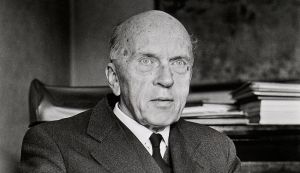From 1945 to his death in 1973, music theorist Erwin Ratz taught theory of form (and later fundaments of musical analysis and the analysis of Beethoven’s quartets and sonatas) at the Academy of Music and Performing Arts Vienna, today’s mdw. He was appointed professor in 1957.

Ratz, who was a student of Guido Adler, Arnold Schönberg, and Anton von Webern, and whose role in founding the Verein für musikalische Privataufführungen [Association for Private Musical Performances] made a decisive contribution to the understanding of contemporary music, had an impact on generations of conductors and composers. And he received international recognition in particular for his tireless efforts as part of the International Gustav Mahler Society, which we have to thank for the publication of the complete critical edition of Gustav Mahler’s works. But it was not only in his chosen academic speciality that Erwin Ratz achieved lasting importance: together with his wife Leonie (Lonny), he also displayed exceptional moral courage during the Holocaust.
During the period of Nazi rule, Erwin Ratz hid Jewish fellow citizens in his small apartment in Vienna’s third district, thus saving them from deportation and almost certain death at the hands of the regime. One of these individuals was the Berlin native Hans Buchwald: in 1943, Lonny Ratz took considerable risks to enable him to travel to Vienna, where Erwin Ratz successfully hid him until the war’s conclusion. On 25 November 2014, in Jerusalem, the commission of Yad Vashem, Israel’s national memorial to the six million Jews murdered in the Holocaust, made the decision to recognise Erwin and Lonny Ratz as “Righteous Among the Nations”.
As part of a ceremony of the Israeli Embassy held at Vienna City Hall on 29 March 2016, ambassador Talya Lador-Fresher honoured Erwin and Lonny Ratz as “Righteous Among the Nations” with representatives of their family, of the Vienna Provincial Government, of the mdw, and of Yad Vashem present.
Executive City Councillor Sonja Wehsely emphasised: “Anywhere where equality and human dignity are called into doubt even just a little bit, there must be a loud outcry—so that we do not
grow accustomed to inhumanity, just like Erwin and Lonny Ratz did not grow accustomed to it. Carrying forth their heritage, remembering them, and honouring their deeds is a task for the future.” In her touching words of thanks, Katharina Maróthy-Ratz, granddaughter of Erwin Ratz, said that it had often been remarked in her family that, back then, there were unfortunately too few people who could muster up this kind of courage.
In Professor Erwin Ratz, our university can count itself lucky to have had a personality of such exemplary human greatness among its teachers.
